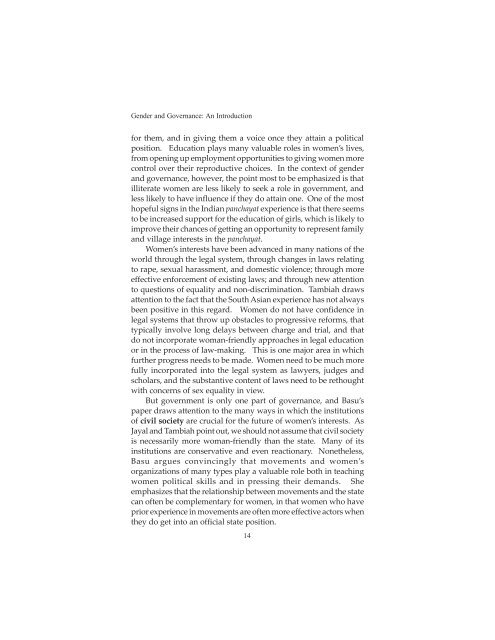Essays On Gender And Governance - United Nations Development ...
Essays On Gender And Governance - United Nations Development ...
Essays On Gender And Governance - United Nations Development ...
You also want an ePaper? Increase the reach of your titles
YUMPU automatically turns print PDFs into web optimized ePapers that Google loves.
<strong>Gender</strong> and <strong>Governance</strong>: An Introduction<br />
for them, and in giving them a voice once they attain a political<br />
position. Education plays many valuable roles in women’s lives,<br />
from opening up employment opportunities to giving women more<br />
control over their reproductive choices. In the context of gender<br />
and governance, however, the point most to be emphasized is that<br />
illiterate women are less likely to seek a role in government, and<br />
less likely to have influence if they do attain one. <strong>On</strong>e of the most<br />
hopeful signs in the Indian panchayat experience is that there seems<br />
to be increased support for the education of girls, which is likely to<br />
improve their chances of getting an opportunity to represent family<br />
and village interests in the panchayat.<br />
Women’s interests have been advanced in many nations of the<br />
world through the legal system, through changes in laws relating<br />
to rape, sexual harassment, and domestic violence; through more<br />
effective enforcement of existing laws; and through new attention<br />
to questions of equality and non-discrimination. Tambiah draws<br />
attention to the fact that the South Asian experience has not always<br />
been positive in this regard. Women do not have confidence in<br />
legal systems that throw up obstacles to progressive reforms, that<br />
typically involve long delays between charge and trial, and that<br />
do not incorporate woman-friendly approaches in legal education<br />
or in the process of law-making. This is one major area in which<br />
further progress needs to be made. Women need to be much more<br />
fully incorporated into the legal system as lawyers, judges and<br />
scholars, and the substantive content of laws need to be rethought<br />
with concerns of sex equality in view.<br />
But government is only one part of governance, and Basu’s<br />
paper draws attention to the many ways in which the institutions<br />
of civil society are crucial for the future of women’s interests. As<br />
Jayal and Tambiah point out, we should not assume that civil society<br />
is necessarily more woman-friendly than the state. Many of its<br />
institutions are conservative and even reactionary. Nonetheless,<br />
Basu argues convincingly that movements and women’s<br />
organizations of many types play a valuable role both in teaching<br />
women political skills and in pressing their demands. She<br />
emphasizes that the relationship between movements and the state<br />
can often be complementary for women, in that women who have<br />
prior experience in movements are often more effective actors when<br />
they do get into an official state position.<br />
14

















